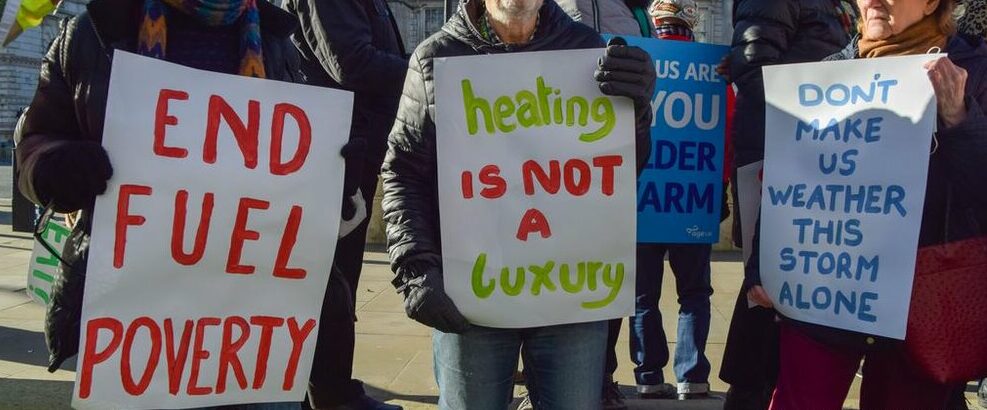Another surreal headline out of Britain warns that “Government considers temporary nationalisation of energy companies to stop collapse”. What is this, the 1970s? And the answer is no, certainly not, because in the 1970s the energy crisis was the result of external factors and people were far more ignorant of the incapacity of the state to plan and manage an economy. Whereas in 2021 the energy crisis was created on purpose by a government that knows socialism doesn’t work but apparently believes that a coat of green paint fixes everything. Governments are intentionally making it harder for inhabitants to acquire food, clothing and shelter, and congratulating themselves for their brilliance even as their stupidity starts to kill people. Now the whole European Union, as well as the United Kingdom, are looking at a bleak winter with energy for heating homes both expensive and scarce. And they did it on purpose, and plan to keep doing it.
The warnings have been coming in for some time. But now the crisis is here: Britain’s ITV just reported that “Minister warns of ‘really difficult winter’ amid rising energy costs and food shortages”. So of course the government has rejected pleas to reduce “green levies” that push up household heating bills. As was once said of Philip II of Spain, “no experience of the failure of his policy could shake his belief in its essential excellence”. Thus Boris Johnson’s priority in the middle of this disaster is to salvage the COP26 summit and lure more governments into his mire. Not only is he not contrite, he’s more arrogant than ever; NBC reports that “British Prime Minister Boris Johnson told world leaders at the United Nations on Wednesday night that humanity has to ‘grow up’ and tackle climate change, saying humans must stop trashing the planet like a teenager on a bender.” While he does it to his own economy.
This disaster did not happen by accident, through external circumstances, or suddenly. But to quote Matt Ridley again, in Britain “When David Cameron’s energy bill was being discussed in Parliament in 2013, the word on everybody’s lips was ‘trilemma’: how to ensure that energy was affordable, reliable and low-carbon. Everybody knew then that renewables were unreliable: that wind power fully works less than one-third of the time, and that solar power is unavailable at night (of course) and less efficient on cloudy winter days. Yet whenever we troublemakers raised this issue, we were told not to worry – it would resolve itself, they said.”
Sure it would. Thus the Global Warming Policy Forum commented in early September that “The entire UK wind fleet was in effect completely absent for much of the day, only rising above a few percent of its theoretical output late in the day when the crisis was over. As a result, conventional gas- and coal-fired generators had to be fired up. The UK’s creaking grid was therefore effectively being propped up by fossil fuels."
Now consider the Times story that “Electric car charging points in people’s homes will be preset to switch off for nine hours each weekday at times of peak demand because ministers fear blackouts on the National Grid. Under regulations that will come into force in May, new chargers in the home and workplace will be automatically set not to function from 8am to 11am and 4pm to 10pm. Public chargers and rapid chargers, on motorways and A-roads, will be exempt. The government is also taking powers to impose a “randomised delay” of up to 30 minutes at other times to avoid pressure on the grid if there is a scramble among motorists to recharge their batteries at the same time.”
Did they tell you that when you bought it? Of course in a way it’s a logical response to having created an energy shortage: Big Brother prevents you from accessing energy he forced you to buy but can’t provide. To rub it in, it’s not just Britain. Germany too has faced record power prices and blackouts. And so will everybody, everybody, who deliberately cripples their energy sector, with or without the smirk. And there’s no doubt that Britain’s energy companies have been crippled by bad policy. It’s just that unless you change the policy, changing ownership changes nothing.
Incidentally, in another exercise in shameless, brainless blame-shifting, Britain’s business secretary said the government will “not be bailing out failed companies” because “There will be no rewards for failure or mismanagement. The taxpayer should not be expected to prop up companies which have poor business models and are not resilient to fluctuations in price.” Unlike, say, the government?
Now, what does anyone think is going to happen once the government nationalizes energy companies? Is Britain going back to the “winter of discontent” in 1978 as everything more or less stopped working? Will they soon be released back into the economy only to go belly-up again? Is there some government plan to make energy not a disaster? Will they dump the entire economy down the drain in pursuit of their Green New Deal or whatever they called it, and claim that although you have nothing you are happy or at least should be?
It never ceases to amaze us that people who know what sort of car the Lada was would favour government control of anything important. And indeed the British government, in those grimly heady days of John Kenneth Galbraith economics, the Club of Rome and so forth did in fact nationalize British Leyland, which at the time had a 40% share of the UK car market including famous brands like Jaguar and Land Rover plus the iconic Mini. Guess what? It was sliced and diced and turned over to another giant government-run conglomerate before finally staggering back into the private sector, going broke and ceasing to make cars in Britain after much of its remaining line was sold to… a Chinese company.
There’s your bright green future. Granny freezing to death while Xi Jinping scoops up your economy and the world. What a great plan. But at least in the 1970s it was done by accident, through policies that achieved the opposite of what their architects hoped and expected. This one is deliberate. They said they would get rid of fossil fuels, mocked those who protested that it would cause economic disaster, and now that it is they’re doubling down. They really mean it.
And what did anyone think was going to happen? Seriously. Citizens should be demanding answers. Even in a country like Canada, where so far the big problem is gas costing $1.35 a litre or more, we need to insist that politicians give a straightforward answer to the question “Did you realize this situation would cause hardship when you created it on purpose?”



You ask, did politicians realized there green policies would cause hardships? I am pretty sure this is a rhetorical question but I want to answered anyways. No they did not but only because it never crossed their mind.